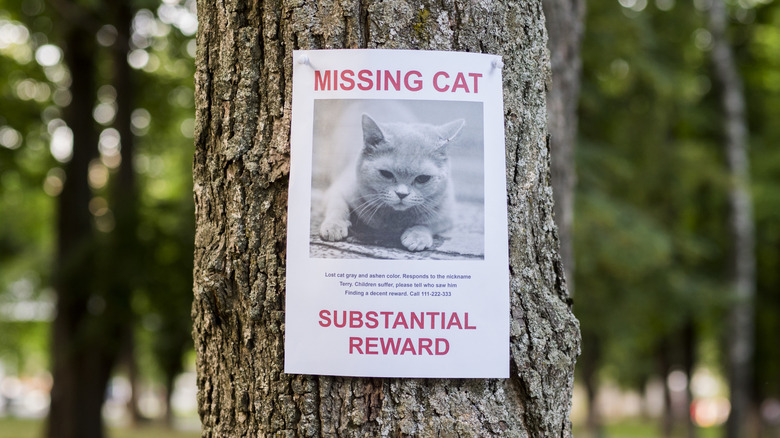How Long Should You Wait Before Giving Up On Searching For A Lost Pet?
We may receive a commission on purchases made from links.
For pet parents, ownership has both highs and lows, from the first introduction to a furry friend to the eventual goodbye. Life with a pet can have many unexpected side effects on your health, particularly your mental well-being. Yet, one of the hardest things to deal with is the uncertainty of a missing pet. For heartbroken owners of a missing cat or dog, one of the most challenging questions becomes "When do I stop looking?"
Deciding when to stop searching for a missing pet is a personal choice made by the owner; there is no definitive answer. However, after exhausting options, searching yourself, reaching out to veterinarians and shelters where the pet may have ended up, taking to social media, and posting flyers, there may come a point when the emotional stress of the search has a negative toll on mental health. The loss of a pet can be as intense as losing a loved one, and accepting that and going through the stages of grief is an essential step to moving forward.
There is no real easy answer, and, ultimately, deciding to give up searching for a pet is a personal decision that requires reflection on what is best for yourself. Even if your pet found a new home or an owner is still holding onto hope that they will come home, the same stages of grief of losing a loved one can occur: denial, anger, bargaining, depression, and acceptance. When you are ready to move on and deal with these challenges, it may be time to halt the search for a missing pet. For the grieving pet parent, there are options for help.
How to deal with loss after a pet goes missing
An indicator that it is time for an owner to stop looking for a missing pet is when they need to focus on their own mental health. This is a significant step, and it can be challenging to undertake alone. Many states offer local services to support those dealing with the loss of a pet, including helplines and in-person or virtual meet-ups. Owners can seek a professional pet grief counselor or a psychiatrist to help develop skills for coping with the loss. Social media groups and message boards also exist to support people through the grieving process. Owners should choose a method of dealing with the loss or disappearance of a pet that suits them best and with which they feel most comfortable.
Many cultures use shrines as a means to remember those who have passed. Creating a memorial or holding a ceremony as a farewell and thank you can help with the emotional process by providing closure and a chance to navigate complex emotions positively. Even if an owner hopes to be reunited with their furry companion, taking steps to help manage the many emotions that come with the absence of a lost pet may help during the process. Tears, frustration, and regret are all understandable when dealing with a missing pet.
Ways to help ensure a pet does not go missing
Pet parents thinking about how to avoid the worst-case scenario should be aware that roughly 3.1 million dogs and 3.2 million cats go missing yearly, and of those, only about 810,000 are reunited with their owners. The highest incidence occurs around the Fourth of July, with a 30% to 60% increase in missing pets. Fireworks, while a joy for people, can be terrifying for pets and lead them to run for cover. It is essential to keep dogs calm during Fourth of July fireworks and consider keeping them indoors as much as possible during the festivities. The same applies to cats, who are best kept inside and away from outside doors.
Getting a pet microchipped can also help reunite a pet with its owner. The information, including the owner's contact, is stored in a database that veterinarians and shelters can access. Owners can also take a more tech-savvy approach, using GPS tools like the Tractive GPS Dog Tracker or a Loot Cat Tracker Collar, allowing them to keep tabs on their pet's whereabouts on their phones.
More practical solutions to prevent an escaping pet include keeping a dog in a backyard using fencing and ensuring it has plenty of stimuli so it does not get bored; a happy dog is a tired dog. For cats, consider keeping them entirely indoors, as not only do they live longer, healthier lives, but the chances of them running away are minimized. A spayed or neutered cat or dog is also less likely to leave home searching for a mate. Facing the reality of a missing furry companion is something that no owner wants to experience, but taking steps can help minimize the chance of having to decide when to stop looking.
If you or someone you know needs help with mental health, please contact the Crisis Text Line by texting HOME to 741741, call the National Alliance on Mental Illness helpline at 1-800-950-NAMI (6264), or visit the National Institute of Mental Health website.


